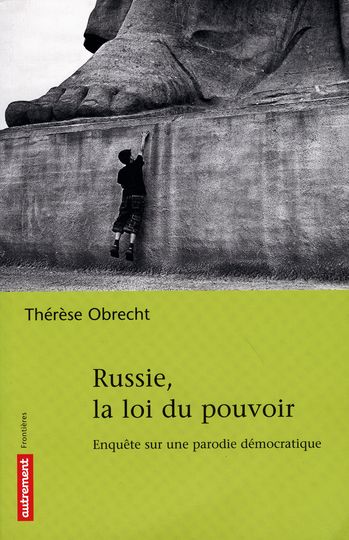In a recent book,ThérèseObrechtdescribes a country where law is completely arbitrary.
Justice ismuzzled by a higher power on the hunt for spies. The army watches its own soldiers drop like flies, not in combat, but because of internal violence. The corrupt police abuse their position and the population, whereas nationalismcontinues to rise, bringing with it an alarming amount of racially motivated and xenophobic attacks.
Thérèse Obrecht’s face is very familiar to French speaking Swiss audiences. This former ski champion turned journalist and historianwas theMoscowcorrespondent for Swiss Romand Television and the NouveauQuotidien from1991 to 1996.
The press is sometimes accused of creating a negative image of Russia, which the country cannot separate itself from.What do you make of this criticism? Thérèse Obrecht: I think it’s a bit of an easy criticism. It’s true that the press often talks of negative things, but not only in Russia. This country’s image is not due to the press. Furthermore, the press also report the facts, not just opinions, and facts stick. The war in Chechnya is a cancer created byMoscow and which is now infecting all of the Northern Caucasus. The prerogatives taken by the secret service are contrary to what Russia signed on to in joining the Council of Europe. You can’t really say that democracy is flourishing in Russia.
In your opinion, what does the country need for the situation to improve? It will take a lot of time. After three-quarters of a century worth of communism, they had to start again from scratch. But there’s no use in having a good constitution and code of law if those laws are not respected. A good framework needs to put in place – especially for business – as in any State in which law and order reigns.
What will the future bring? We have to wait and see what happens after Vladimir Putin. As I see it, the country is at a crossroads. In Russia, the powerful have always been above the law, whereas the citizens were just subjects.
This is again becoming the case.
The State defends its own interests rather than protecting its citizens, which is not very reassuring. Criticism is no longer tolerated and democratic checks and balances are gradually being eliminated.
This being said, the country has come a long way. There are fantastic people fighting for their democratic rights and a civil society is starting to see the light. Despite years of repression, the intelligence pool is enormous and surprises me on each visit, not just in Moscow, but in the outer regions as well.
And Russia possesses huge amounts of natural resources, as well as an excellent level of education. In principal, all this should permit the rebirth of a great nation on solid ground. The challenge is immense however, as large as this country’s continental dimensions and their shock after losing an empire.
What conditions are necessary for this change to occur? To succeed in creating functioning institutions, to go from one state system to another, Russia will need a different kind of state official, one whose concern is above all the common good. The first generation not to have been raised on Marxism-Leninism is presently arriving at maturity. These young people, often educated abroad, are imbued with different values and a different mentality.
It’s great to see the Russian youth in the big cities, even though, alas, there is also the extremist fringe among this youth.
These revenge-fuelled phenomena will exist as long as the collective memory work has not been done, as long as the past has not been overcome. The situation will change, but it will take time.













